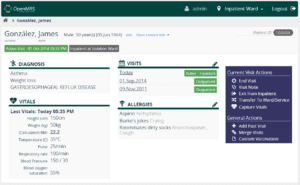Streamlining Healthcare: The Role of Hospital Management Systems
In the complex world of healthcare, where efficiency and accuracy are paramount, Hospital Management Systems (HMS) have emerged as indispensable tools for managing and improving hospital operations. These systems integrate various functions within a hospital, from administrative tasks to patient care, aiming to enhance overall efficiency and patient satisfaction.

What is a Hospital Management System?
A Management System is a comprehensive software solution that facilitates the seamless functioning of a hospital or healthcare facility. It typically includes modules for patient registration, appointment scheduling, billing, electronic medical records (EMR), inventory management, and more. The system centralizes data and automates processes, thereby minimizing paperwork, reducing errors, and improving overall productivity.
Benefits for Hospitals
1. Improved Operational Efficiency: HMS automates routine tasks such as appointment scheduling, billing, and inventory management, freeing up staff time and reducing administrative errors.
2. Enhanced Patient Care: With easy access to patient records and clinical history, healthcare providers can make informed decisions quickly, leading to better diagnosis and treatment outcomes.
3. Streamlined Financial Management: The billing and invoicing modules of HMS ensure accurate billing and timely payments, improving revenue management for hospitals.
4. Better Resource Utilization: From managing staff schedules to optimizing bed allocation, HMS helps hospitals allocate resources efficiently, reducing waiting times and enhancing patient flow.
5. Compliance and Security: HMS ensures that hospitals adhere to regulatory requirements and standards, safeguarding patient data through robust security measures.
Benefits for Patients:
1. Improved Access to Care: Patients can easily schedule appointments online, reducing wait times and facilitating timely access to healthcare services.
2. Enhanced Communication: HMS often includes patient portals where individuals can access their medical records, communicate with healthcare providers, and receive updates on their treatment plans.
3. Accuracy and Safety: By reducing manual errors and ensuring comprehensive medical histories are available, HMS enhances patient safety and reduces the likelihood of medical errors.
4. Convenience: Features like online appointment booking and electronic prescriptions make healthcare services more convenient and accessible for patients.
Challenges and Considerations:
While HMS brings numerous benefits, implementing and maintaining such systems require careful planning, training, and ongoing support. Integration with existing hospital infrastructure and ensuring data interoperability across different departments remain key challenges.
In conclusion, Hospital Management Systems play a pivotal role in modernizing healthcare delivery by improving operational efficiency, enhancing patient care, and ensuring better resource utilization. As technology continues to evolve, HMS will undoubtedly remain at the forefront of healthcare management, empowering hospitals to deliver high-quality care effectively and efficiently.

